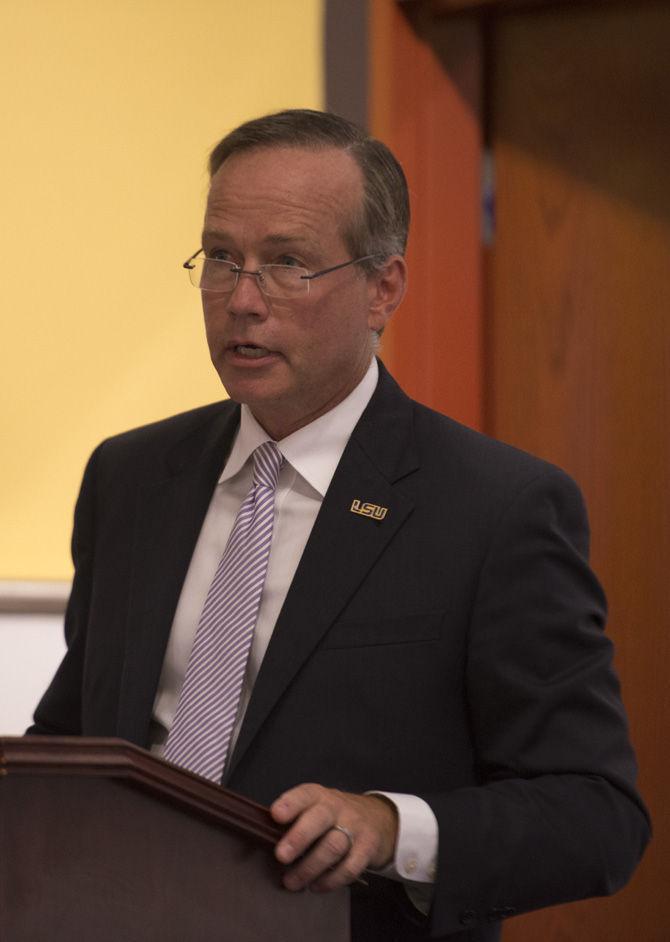Higher education leaders find themselves limbo this fall as they prepare for a gubernatorial election, a new crop of legislators and an ambiguous budget deficit.
Higher education evaded devastating cuts estimated at $600 million during the summer’s legislative session, and LSU President F. King Alexander said Aug. 20 that university system heads will meet every week this semester to discuss funding strategies and the gubernatorial candidates’ platforms regarding higher education.
“We’re hanging out there on a ledge,” Alexander said. “And we want to make sure we work with our legislative leaders to understand that we have already been cut dramatically to the point where we are.”
A web of forecasting steps are necessary for an accurate budget prediction, said Board of Regents Deputy Commissioner for Finance and Administration Barbara Goodson.
Goodson said the Board did not have enough time last school year to deal with the higher education crisis, and committees will be required this year to make assumptions about important state revenue factors, such as oil prices and personal income growth, to estimate upcoming revenue.
“We’re very dependent upon these other steps and other parties meeting to issue these forecasts,” Goodson said.
She said Louisiana’s higher education institutions, as well as grade schools, currently are not fully funded, and higher education is particularly in need of money for deferred maintenance.
Recently granted autonomies, such as the ability for universities to decide their own student fees, will play an important role in piecing together a functional higher education system, Alexander said.
Though he emphasized the Board of Supervisors has not decided to increase fees yet, Alexander said the conversation will depend on input from deans and students. Other university money-savers include the ability to independently pay for their own risk management plans and purchase items in bulk.
Alexander said LSU dodged a bullet receiving the same amount of funding for the 2015-2016 fiscal year as it did for the 2014-2015 fiscal year, as the alternative was “far, far worse.”
“We’ll save millions down the road with being able to bulk purchase,” Alexander said.
To obtain some of the Board of Regents’ missing funds, Goodson said legislators will have to establish a method for the Board to receive payments from the Louisiana Racing Commission, which has gone unpaid for years and owes roughly $500,000 annually.
Republican state Rep. Brett Geymann said higher education is one of the greatest funding areas thrown on the cutting block when legislators have to balance the budget because its funding is not dedicated by the Louisiana constitution.
“That’s the battle we face every year,” Geymann said. “That’s why it’s so hard to fix the problem because when we make reductions, it always falls on the areas that generally are the most important.”
Geymann said the final budget is usually at the expense of higher education and public health care because their funds are not dedicated by law.
Legislators, including Geymann, have toured the state and found higher education and health care to be the two most important public services to Louisiana residents.
“The whole process needs to be reformed — the way that we forecast, the way that we spend and the things that we fund all need to be reviewed,” Geymann said.
Reforming the system will take courage and work, and the new governor will have to change the way the budget system is structured, Geymann said.
LSU economics professor James Richardson served on the Louisiana Revenue Estimating Conference for years and said government leaders have avoided decisions on what services to fund for the past eight years.
“We still have not decided on what we want to have in terms of public services, and at some point, we need to be upfront and honest about it,” Richardson said.
The Legislature did not fundamentally solve any of its economic issues this year but merely found a short-term solution, he said.
He said Gov. Bobby Jindal imposed the Student Assessment for a Valuable Education program, which he called “nonsense,” only so Jindal could claim he did not raise taxes.
SAVE imposes a $1,600 fee on students, but an equal tax credit ensures students do not have to pay for it, and the tax burden essentially remains unchanged.
Richardson said tuition flexibility is vital to a functional university system and stable economy. He said LSU has to remain competitive to recruit students.
“You can’t just raise tuition willy-nilly,” Richardson said. “There’s a market we have to worry about. Students have choices, and they don’t have to come to LSU.”
Higher education leaders prepare for another budget battle
By Sam Karlin
September 9, 2015
LSU president F. King Alexander takes the podium on Wednesday, Sept. 2, 2015, during the Faculty Senate meeting in Barnes and Noble.
More to Discover











